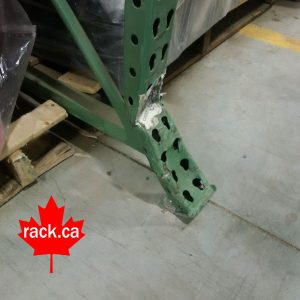Warehouse racking is the backbone of efficient storage and operations in any warehouse. These structures play a crucial role in maximizing space, streamlining inventory management, and ensuring the smooth flow of goods. However, when racking systems become damaged, they pose safety risks to employees, threaten inventory integrity, and lead to costly downtime.
Addressing warehouse racking damage promptly and effectively is essential for maintaining operational efficiency and safety. This article will guide warehouse managers through identifying, assessing, and tackling damaged warehouse racking.

Identifying Damaged Warehouse Racking
Recognizing damage to your racking system early can prevent further issues down the line. Here’s what to watch for during inspections:
- Bent beams, broken uprights, and leaning racks: These are clear signs of compromised structural integrity.
- Rust, corrosion, or loose bolts and connectors: These can weaken your racking over time.
- Misaligned or wobbly components: Often indicate structural instability and potential for collapse.
Routine inspections are vital to the early detection of damage. By implementing a strong inspection program, you can minimize risks to employees and inventory.
- Visual checks: Train warehouse staff to perform regular visual inspections as a first line of defense.
- Professional assessments: Hire qualified engineers or racking specialists to conduct comprehensive inspections.
- Inspection schedule: Frequency should depend on factors like load demand and usage intensity but conducting checks at least once a quarter is a good start.
Identifying the Causes of Damage
Understanding what causes damage helps in both repair and prevention. The most common culprits include:
- Forklift collisions: One of the leading causes of racking damage, especially in high-traffic areas.
- Overloading: Exceeding weight limits can bend beams and compromise system stability.
- Wear and tear: Over time, environmental exposure can lead to corrosion or fatigue in racking materials.
Addressing the root causes of damage is just as important as repairing it. For example, implement clearer aisle signage and collision barriers to protect racking from forklifts. Managers should also ensure that employees understand maximum load capacities and distribute loads evenly.
Effective Solutions for Damaged Racking
While working on a longer-term solution, take immediate steps to secure the area and mitigate risks. Use caution tape or barriers and clearly mark and restrict access to damaged racks. In addition, redistribute loads to relieve strain on damaged sections.
Seeking professional repair services is often a viable option to restore structural integrity:
- Correct bent or cracked components: Partner with certified repair specialists who can assess and fix the damage.
- Replace severely damaged parts: Swap out beams, uprights, or connectors with compatible components.
- Add reinforcements: Use braces or supplemental supports for extra stability.
Investing in strong preventative measures ensures similar issues don’t arise again. The best way to do this is to upgrade to advanced systems. High-quality materials or racking with enhanced safety features (e.g., rack guards) are worth the investment. Managers should also implement rack protection systems with guards or bumpers to shield structures from forklift collisions.
Prevention Strategies
Operator Training
Employees play a huge role in maintaining racking safety. Training should focus on proper forklift operation and safe navigation of aisles, as well as loading techniques, emphasizing weight distribution and adherence to weight limits.
Weight Compliance
Make sure all teams follow manufacturer weight guidelines to avoid accidental overloading. Use signage near racks to remind staff of capacity limits.
Regular Maintenance
Consistent maintenance ensures small issues don’t escalate. Have professionals regularly inspect and repair damaged components to prolong your racks’ lifespan.
Environmental Considerations
Rust and corrosion are common threats. Apply protective coatings and, when necessary, implement climate-controlled storage to combat wear and tear.
When to Replace Instead of Repair
While repairs are often more cost-effective, some situations necessitate full replacement:
- Severely compromised integrity: If damage is extensive and can’t be fixed reliably.
- Upgrading systems: Modern designs may offer better space utilization, compliance, and safety.
New racking systems meet updated compliance standards and reduce risks. But making the switch to newer systems isn’t just about safety. Modern racking designs can also streamline inventory management and boost overall productivity.
Keep Your Warehouse Safe and Efficient – Contact Canadian Rack Technologies for Expert Racking Solutions Today!
Damaged warehouse racking requires swift action to prevent safety risks, protect inventory, and avoid operational downtime. By identifying and addressing damage promptly, you can maintain a safe and efficient working environment. However, prevention is always better than repair—invest in strategies like employee training, proper maintenance, and high-quality protective measures to keep your warehouse running like a well-oiled machine.
Need help with damaged racks or looking to upgrade? Contact Canadian Rack Technologies for the best warehouse storage solutions, including warehouse cantilever racking, industrial storage racking, and pallet racks in Toronto, Mississauga, and across the GTA!
